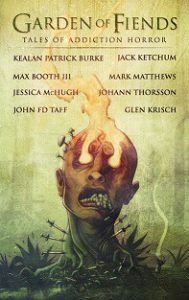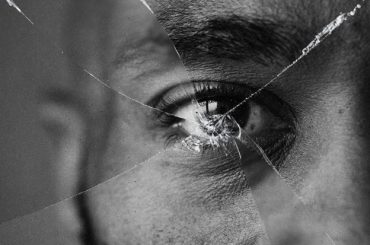From an early age, books shaped who I was. Writers were heroes to emulate. I wanted to be Thoreau, I wanted to be Mark Twain. I wanted to be Jack Kerouac.
There was something inside me that only stories could reach, a music only literature could play.
A similar reaction occurred when I had my first drink. The warm confidence, the blissful contentment. A union with God. All my curses lifted, all my deficits erased. It was love at first sip. Other drugs soon followed. I said “no” to nothing, “yes” to everything.
Pretty soon, I needed it to function. I started drinking alone. Getting shakes. Sweats. I went on drug binges and mixed drinking with cocaine, acid, or crystal meth every chance I could. I needed substances to feel normal, otherwise, I had perpetual flu-like symptoms and was intensely angry and bitter at the world. I didn’t care if I died and was quite certain that, due to drugging and drinking, I would die before I was 30 years old.
I nearly proved myself right. By 23 years old, I had alcoholic hepatitis of the liver, a swollen pancreas, my stomach was bleeding and I was shitting blood (sorry, I know that’s gross to read). More than once I went to detox to sober up after the pain got too much, but then I would drink soon as they released me. When money got tight and I needed $1.89 for a half pint of vodka, I visited car washes since that was the best place to gather returnable cans. Crazy thing was, the more disgusting I became, the more I needed to delude myself about who I really was. In my twisted mind, I was some misunderstood genius who society hadn’t found a place for, and therefore drinking was my only crutch to live with lesser mortals. Truth was, I was a pathetic lump of flesh.
A turning point came when, rather than just detox, I finally succumbed and went to residential treatment for three weeks. I didn’t want to go, but I had no other options. My body could not take any more liquor in it. My spirit was drenched with despair. I remember sitting in the treatment center, unable to stop the tears, and looking out the window with plans to leave, but I had no place to go. Instead, I stayed put, endured the pain of living, and found some humility and some courage. Each day sober felt like a miracle. I learned so much about why I was doing what I was doing, how to stop it, and most importantly, decided my life was worth saving.
No way in hell did I ever think I would go back to college to help other addicts, but that’s what I did. I got a masters in counseling, became a certified addictions counselor, and worked in many different treatment centers. My curse had changed to my calling.
And I returned to my desire to write.
Once I got sober, I started writing again. Writing out the darkness I had experienced was incredibly therapeutic, for if you want to tell the truth, best to do so by making up a story. I wrote one novel, Stray, which was based on a treatment center where I worked that shared a parking lot with an animal shelter. Next I wrote MILK-BLOOD, which tackled poverty, urban despair, and heroin addiction with a supernatural slant. Many readers were shocked by the darkness in the book, but the crazy thing is, it was all true (even if it didn’t happen) and much of the darkness in the book was actually understated. After writing the sequel, All Smoke Rises, I decided to reach out to other authors of dark fiction to see how they would tackle the subject of addiction.
The blog post for ‘addiction horror’ received over ten thousand hits. Hundreds of submissions followed, and I had to boil these down to eight pieces, largely of long fiction and novellas. I can’t promise you’ll like this collection, but I can promise it is different. In scope, in length of stories, in content. I’m incredibly proud of what’s inside, since addiction and horror seem a perfect fit. It takes a works of horror to fully explore the devastation of addiction.
Addicts, in a certain sense, are not that different than vampires: they live within society but hide their true nature while they feed off the living, siphoning their money, their sanity, always safest in the shadows. They feel cursed with their affliction but unable to stop the compulsion to suck the blood out of others.
The blood they suck out is usually their family’s, who suffer as if something monstrous has taken over their loved one. I can’t help but think of the movie, The Exorcist, perhaps the most terrifying horror movie ever made, as an analogy of a desperate, powerless mother trying to save her daughter from addiction. Thankfully, there are parents whose children are saved through sobriety and recovery. I know it works. I’ve seen the horror and the damage done, and I’ve seen many come out the other side and survive. Not without their share of scars. This is the story of some of them.
Check out Garden of Fiends: Tales of Addiction Horror
with stories by; Kealan Patrick Burke, Jessica McHugh, Max Booth III, Glen Krisch, John FD Taff, Johann Thorsson, Mark Matthews, Jack Ketchum
“There’s something here to scare anyone and everyone. Garden of Fiends pushes all the wrong buttons in all the right ways!”-Jonathan Maberry, New York Times best-selling author of Dogs of War and Mars One
“Garden of Fiends is scary in the realest of ways. What fertile ground for horror.” –Josh Malerman, Bram Stoker nominated author of Bird Box
“A brilliant and original concept, Garden of Fiends captures the struggles of addiction and the horrors they inflict on those affected by it. Yes, it is dark and visceral, but with moments of hope throughout that make this a memorable collection of stories.” –The Horror Bookshelf










7 Comments
My feeling is that people in recovery are seeking role models of success and prosperity and it is unhealthy to describe addicts as ‘vampires’ – people in recovery can struggle in issues of self-esteem – and climb hard to the summit of the promise of not regretting the past – addicts are not ‘vampires’ – they are people in deep emotional and spiritual pain that are trying to survive – I am not sure the reason or point in this except glorifying (or gorifying) addiction – the only blood being sucked here (in the author’s terminology) is the money of those that buy this ‘horror’ story – isn’t there enough pain on this planet already? The need is for stories of courage, hope, success and overcoming challenges – not for finding the darkest and most discouraging – as it says above – there is something in this book to scare anyone – is that a valid reason to use an addict’s dark past to scare people – the point of experience is to encourage and to lift up the spirits – this is one book I feel seriously turned off by and hope it doesn’t do the damage and stigmatizes addiction to the masses. As it says above – a fertile ground for horror. Thanks for turning recovery into a horror story.
I felt like a vampire in my own addiction, (doesn’t mean your experience was mine) I had a compulsion to feed, hurt those close to me, again and again, but felt cursed by my affliction. Based on Amazon reviews, those who have read the book came away with a deeper empathy for those suffering from addiction. As a therapist who has worked with addicts for nearly 20 years, I don’t feel it stigmatizes, but rather offers an unflinching look at the horrors an addict goes through, but with compassion for the addict. My other books, MILK-BLOOD, and STRAY, are similar. As is the case with most comment sections, it’s hard to have a true discussion, but I am certainly happy to read your comment and use it for self-reflection.
I appreciate your humility and response Mark – I think it is ok to agree to disagree – labelling an addict by their behavior can confuse actions and motivation – an addict does not get up from bed and make a decision to hurt others – in most cases – addicts have remarkable acuity to their destructive behaivor and live in severe anguish and each day pledge to stop using and stop hurting – but the pain and habit of trying to relieve the pain is ingrained – again I am not sure of the utility of this effort – my posture is to promote self-compassion – to avoid labelling – to see the years of pain as a portal to healing – and to help people in recovery achieve a positive outlook on themselves and the past – to call them vampires does nothing but create more pain, less self-compassion, and is a sensational method rather than decreasing the drama associated to addiction and recovery – I see addicts as courageous survivors of in most cases dsyfunctional parenting and sensitive souls that need support rather than stigmatization. Yes comments can (and did today) result in misunderstanding – I’d be happy to speak to you directly – I’ll email me contact info – as I am also authoring in the recovery/healing space – but from a diametrically opposite angle.
I don’t know that we are so diametrically opposed, we are probably pretty similar, but it seems a bit overboard accusing me of creating more pain and lacking compassion by making a metaphor that I feel fits. The majority of responses to the book from those with investment in addiction recovery has been positive (I’ve not received anything negative until now) If it offends, I apologize, but I still feel the metaphor fits. Everyday I had to wake up and do something illegal, like a vampire who needs blood, and felt the obsession and need for the substance was a curse. To not have a drink or drug in my system was like a vampire dying of thirst, and thus my thirst was all that mattered. Like most addicts, I didn’t think of hurting anyone, but they were hurt regardless of my intentions. Ask any parent of an addict of their suffering (I’m sure you’re well aware of their pain as much as I).
I think the metaphor actually offers compassion (but maybe I have a different view of vampires). If you followed me day to day you would hear me explain to perplexed families and loved ones why addicts do what they do. I tell others that to ask someone who is active in their addiction not to get high is the same as asking someone who is drowning not to breathe (or like asking a vampire not to drink blood). I fully understand why an addict steals his little brothers video games and pawns them. Or lies about needing money, “Mom, I need fifty bucks or they’re going to kill me” but it’s a complete lie only to get high again. Or steals their parents car. Or gets high the day they leave a treatment center after swearing for weeks they’d stay clean. It’s this disease of addiction which hijacks one’s brain completely. The need to get high just to feel normal is, to me, exactly like the life of a vampire. Garden of Fiends is a book meant to highlight the horrors of being an addict. My life’s career, experience in the 12 steps, work with clients, and other books, offer hope (check out Chasing the Dragon: Running to Get High if you’d like). Garden isn’t mean as some sort of inspiration or recovery tool. But Your point is taken and I’m not asking you to change it. All good.
thanks Mark for providing insight into your perspective – there is nothing in your comments that I disagree on – my zen here is that a vampire by nature and design and for survival must attack for blood – and on the surface and by actions (and harm) the vampire may appear the same – but that is superficial – under each attack (unlike the vampire) there is a good person in great suffering, a divine soul of goodness, a hero shut off by bad parenting, circumstances and ingrained patters of self-sabotage – a vampire is a vampire by nature – an addict is an addict completely divorced from the nature of the underlying humanity that is choked off. A vampire cannot recover – an addict often does – as you say – it may ‘feel normal’ – but it is not normal (in the vampire’s case – it IS normal) – so the metaphor falls short and stigmatizes – since it defines the addict not by the human essence – but rather by the surface pain and learned avoidance behaviors – I am appreciative of your engaging on this comment stream but I agree this is better done in person – perhaps the universe can deliver that to us some day….
Mark, absolutely wonderful article. A great perspective, and a story of the factors that led to and fed your addiction leading to a passion for writing that is very similar to my own. I would like to say, in reading the comments section here, that I, for one, thoroughly enjoyed your comparison of addicts, or rather, you as a formerly active addict, to vampires. There’s a great quote from Anthony Kiedis’ book, Scar Tissue, that your comparison reminded me of:
“When you’re using drugs, you’re driven by this mystical black energy, a force inside you that just won’t quit. And the weaker you get, the more you feed into that energy, and the more it fucks with you. When your spirit becomes dark and your lifestyle becomes dark, your existence is susceptible to infiltration by dark spirits. I’ve seen it so many times with addicts. You can see that they’re controlled by dark energy, the way they look, their appearance, their voice, their behavior, it’s not them.”
I don’t think ascribing a dark metaphor to active addiction is stigmatizing; I do think being honest about what your experience was like can only help those trying to move forward from their own experience. I also will respectfully disagree with Chayton’s statement that “a vampire is a vampire by nature – an addict is an addict completely divorced from the nature of the underlying humanity that is choked off.” First, I would say that the disease model of addiction dictates that an addict IS an addict by nature. And second, I believe that that is one of the greatest tragedies of someone struggling to break free from the bonds of addiction, that despite their vampiric ways, they cannot divorce themselves of their humanity completely. As I wrote recently in a blog, “Relapsing after being sober for any significant period of time is like crossing into the dark part of a fairy tale, into the shadowy woods where witches in huts, brutal huntsmen, and evil fairies looking to strike dubious bargains lurk behind every copse of trees. You can see the castle off in the distance, and you know in your bones that you used to live there, used to be happily-ever-after, but you cannot for the life of you remember the way back.”
Thanks again for the article, Mark. I’ll be posting on the addiction awareness page I manage, ‘Shine a Light on Heroin.’
Christa – it must be clear from my comments – that I vehemently reject the ‘disease’ concept of addiction – as I reject the ‘vampire’ analogy in the same thrust of love for people in recovery. Even if I might for purposes of argument – in total disregard for the non-scientific assumption of ‘an addict is an addict by nature’ – that argument still ignores the fact that a vampire can never change – an addict surely can – and does sometimes on their volition – other times in help groups – do you define an addict that has been 30 years off drugs – living a responsible and healthy life – as an addict – so this is a predestined life-long sentence? Do you feel that an infant (predetermined in your understanding to addiction) if brought up in a loving family and given non-judgemnent support is still going to become an addict – even if so, can’t you see that the term REcovery and REturn to sanity – implies that the true nature of an ‘addict’ is a recovery of their inner human self – and returning to the essential nature – or do you feel that an addict is forever an addict and recovery is like keeping their finger in the dam – I prefer to see humanity as essentialy human – and that 100% of humanity is born in potential for intimacy, connection, service and a drug-free life. The disease concept is a creation of a rehab industry culling for government and insurance money – charging people as much as $50,000 for 28 days of 12 step meetings and massages. There is no final judge or jury here – I see addiction as a learned and entirely unhealthy mechanism for people or children in deep emotional pain and lacking spiritual scaffolding for life. If this is a disease – surely big pharma is going to find that gene – sell us a drug – and goodbye to the need for spiritual programs like the steps or any other form of recovery. Is that likely? and Is that not the end thinking of the disease concept? I have never met a vampire in recovery – I have met brave souls that are in recovery for decades of emotional abuse and physical destruction by substance abuse – that have the courage to REcover their true selves and REturn to a healthy life. Many blessings to you…